Arson Attack At MEK’s Political Office In Berlin
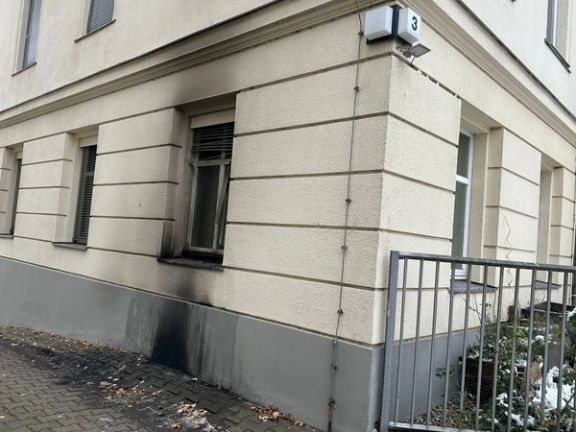
An arson attack has targeted the building of the National Council of Resistance of Iran (NCRI) in Berlin Monday morning, the third such attack on the Mojahedin-e-Khalq's (MEK) political arm this year.

An arson attack has targeted the building of the National Council of Resistance of Iran (NCRI) in Berlin Monday morning, the third such attack on the Mojahedin-e-Khalq's (MEK) political arm this year.
The NCRI, based in Paris, promptly attributed the attack to agents of the Islamic Republic.
Police swiftly responded to the incident, launching an operation in the Berlin district of Schmargendorf, as reported by Bild. Initial findings indicated that a side window on the ground floor had been destroyed, and the assailants, yet to be identified, attempted to set the building ablaze.
During the ensuing investigation, law enforcement discovered evidence including petrol cans and a gas bottle. Members of the council managed to extinguish the fire before it could spread to the interior, avoiding injuries. However, the building sustained material damage.
This is not the first instance of aggression against the resistance movement. In 2019, the same building experienced a fire, prompting an examination of potential political motivations. The ongoing police investigation in the current case seeks to unravel the motives behind this latest attack.
In a statement, the NCRI said the ongoing attacks, including two this year, one in May and another in June at a building belonging to the NCRI supporters in northern Paris, would not intimidate the organization, branding the culprits "terrorists and mercenaries of the Quds Force and the Ministry of Intelligence of Iran".
"As the Iranian Resistance has repeatedly stated, appeasement with the mullahs’ regime and actions such as the release of Assadollah Assadi, a terrorist diplomat responsible for organizing a bomb attack at the Iranian Resistance gathering in Villepinte, Paris in June 2018, have more emboldened this regime in terrorist crimes," it said.
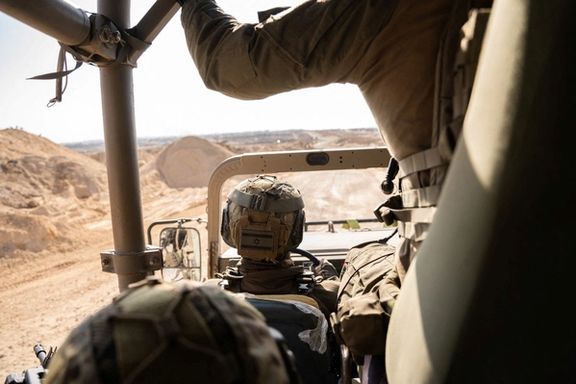
Amid Israel's renewed ground offensive on the Gaza Strip, an Iranian hardline newspaper claims Israelis "still have to see the nightmare of operations larger than October 7."
The firebrand editor of Kayhan newspaper, Hossein Shariatmadari, referenced Khamenei's recent remarks, stating, "Israel is trapped in the quagmire of its attack on Gaza," which was triggered by a surprise invasion of Israel by Hamas on October 7, in which 1,200 mostly civilians were killed and 240 more taken hostage to Gaza.
In spite of the fact half of Gaza is displaced amidst mass destruction from an Israeli retaliation never seen before since Iran-backed Hamas took over the strip in 2007, he said, "Despite all the military assaults and ground incursions into Gaza, Hamas maintains field control." Dozens of Hamas's top commanders have been assassinated and swathes of the strip turned to rubble yet Shariatmadari expressed 'doubt' about a Hamas defeat. Hamas's most wanted live in an extensive underground tunnel network which has also been badly hit by Israeli strikes.
Amidst the comments which mimic regime rhetoric, the Israeli military has issued additional evacuation orders and pledged to strike south Gaza with "no less strength" than the force employed in the north, which has left large areas resembling a moonscape.
Many of Gaza's 2.3 million residents had previously fled to the south following initial orders to evacuate the north in the early days of the conflict.
The Hamas-controlled Health Ministry in Gaza reported a death toll exceeding 15,500 since October 7, with over 41,000 Gazans wounded. While the ministry does not distinguish between civilian and combatant casualties, it noted that 70% of the deceased were women and children.
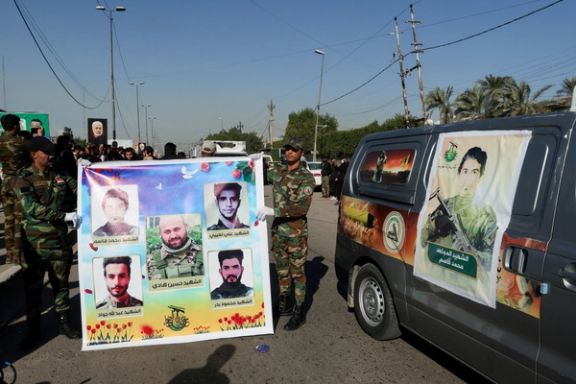
A US air strike killed five Iran-backed Iraqi militants near the northern city of Kirkuk as they prepared to launch explosive projectiles at American forces.
A US military official confirmed a "self-defense strike on an imminent threat" that targeted a drone staging site near Kirkuk on Sunday afternoon.
A statement by the Islamic Resistance in Iraq, an umbrella group representing several Iraqi armed factions with close ties to Tehran, said five of its members had been killed, and vowed retaliation against American forces.The group had claimed several attacks against US forces on Sunday.
Earlier Sunday, the US military official said that American and international forces were attacked with multiple rockets at the Rumalyn Landing Zone in northeastern Syria, but there were no casualties or damage to infrastructure.
Iraqi armed groups have claimed more than 70 such attacks against US forces since October 17 over Washington's backing of Israel in its bombardment of Gaza.
The war, initiated by the Hamas invasion on October 7, resulted in at least 1,200, mostly civilians losing their lives, and an additional 240 taken hostage. Retaliatory attacks have left over 15,000 dead in Gaza, with hundreds of thousands displaced. Israel pounded the enclave to uproot the Islamist group, which has made the war exceedingly bloody hiding deep among the civilian population and underneath the coastal sliver’s non-military facilities.
In November, the US launched two series of strikes in Iraq against Iran-aligned armed groups who had engaged in attacks against American forces. The strikes killed at least 10 militants who were identified both as members of shadowy militia Kataeb Hezbollah and of Iraq's Popular Mobilization Forces, an official security institution composed mainly of Shiite Muslim armed groups.
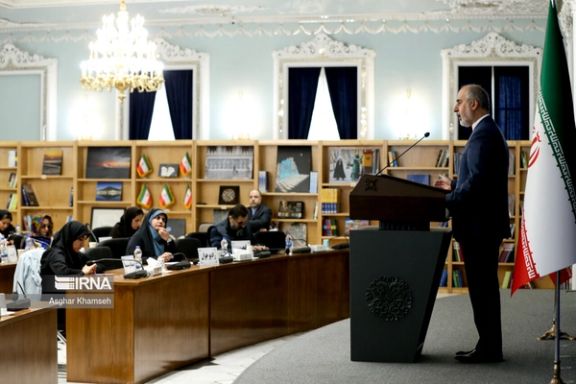
After Iran's Revolutionary Guards confirmed that two IRGC officers were killed in an Israeli attack in Syria, Tehran vows revenge.
Iran’s Foreign Ministry spokesman Nasser Kanaani said Monday that the IRGC forces were in Syria “on an advisory mission,” threatening that "No action against the interests and security of Iran, as well as our advisory forces in Syria, will go unanswered, and this has been proven before."
He did not elaborate on when and where Iran has avenged attacks on its forces as the Islamic Republic usually cheers about attacks on American and Israeli targets by its proxy militia across the region but hardly ever claims responsibility for such strikes.
Since the global outcry against Iran’s support for militant groups has intensified following the onslaught of Israelis by Iran-backed Hamas on October 7, the Islamic Republic authorities, including Supreme Leader Ali Khamenei himself, claim that the regime has no proxy regional forces. Meanwhile, Iran admits that it provides financial and logistic support for the likes of Hamas but claims it has no say in their operations. Additionally, Iran’s Revolutionary Guard has an extra-territorial wing – the Quds (Qods) force, which has either established or funded several such groups.
Iran’s Revolutionary Guards confirmed Saturday that two of its officers were killed in Syria, after Damascus announced that Israeli airstrikes hit a number of targets near the Syrian capital overnight. The IRGC said Mohammad Ali Atai (Ataei) Shoorcheh and Panah Taghizadeh were “martyred” while on an advisory mission to Syria, blaming the “Zionists” for their death.
Israeli airstrikes hit several areas on the outskirts of Damascus early Saturday, causing "material losses," according to Syrian state media. The strikes targeted the southern Damascus suburb of Sayyida Zeinab, where Hezbollah-affiliated forces operate. The Syrian Observatory for Human Rights reported two Syrians and two foreign citizens killed, with five others wounded.
Late in September, the open-source intelligence social media account Intelli Times announced that Taghizadeh was about to arrive in Syria to help Iran-backed forces in the region. Intelli Times also revealed that the officer was part of Unit 340 of IRGC’s Quds Force.
While Israel’s military does not, as a rule, comment on specific strikes in Syria, it has admitted to conducting hundreds of sorties against Iran-backed forces, including Hezbollah fighters, attempting to gain a foothold in the country over the last decade. The recent surge in attacks aligns with the Israel-Hamas conflict that started in October.
Since then, Israel has targeted Syria, impacting international airports in Damascus and Aleppo for over a month, likely thwarting the transfer of weapons from Iran to its proxies in Gaza and on Israel's borders. Iran has played a significant role in supporting Syrian President Bashar al-Assad throughout the 12-year civil war, deploying fighters to tip the balance in Assad's favor. Despite Tehran maintaining what it calls a military advisory role, numerous Iranian Revolutionary Guard members have lost their lives in the Syrian conflict.
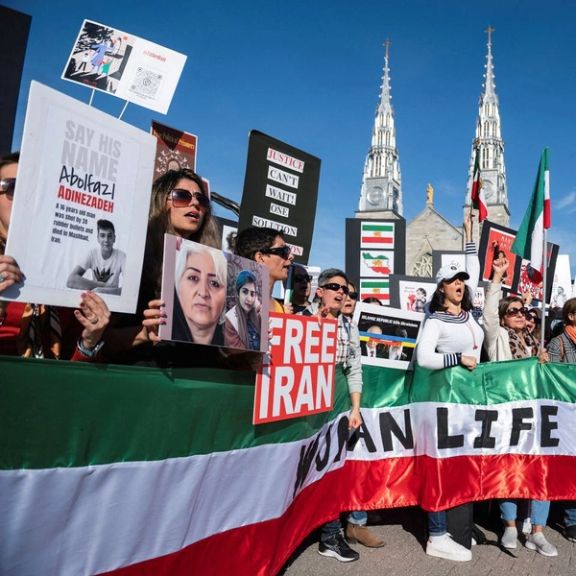
The Canada Border Services Agency (CBSA) has barred entry for several senior regime officials while investigating 100 who hold Canadian citizenship.
As scrutiny deepens, the CBSA is investigating dual nationals with links to Tehran. Nine cases have already been forwarded to the Immigration and Refugee Board for a thorough assessment of their eligibility to enter Canada.
The stringent measures are a direct outcome of a policy implemented by the Liberal government last year, coinciding with widespread protests in Iran following the death of Mahsa Amini, a 22-year-old Kurdish-Iranian woman, in the custody of Iran's morality police.
Concerns about Canada serving as a safe haven for high-ranking Iranian officials were exacerbated after the identification of a former Tehran police chief at a gym near Toronto in 2021.
Under pressure from the opposition Conservatives and the Iranian-Canadian community, the Liberal government, under the leadership of then-public safety minister Marco Mendicino, designated the Islamic Republic of Iran as a "regime that has engaged in terrorism and systematic and gross human rights violations" under the Immigration and Refugee Protection Act (IRPA) in November 2022.
The designation resulted in the inadmissibility of tens of thousands of Iranian regime officials, including several from the Islamic Revolutionary Guard Corps (IRGC) to Canada.
As of November 20, 2023, the CBSA has reviewed around 17,800 visa applications under the IRPA designation, leading to 78 individuals being denied access to the country.
Based on referrals and tips, the CBSA has initiated investigations into 141 individuals with status in Canada, closing 38 cases. Ten individuals have been deemed inadmissible under the IRPA designation.
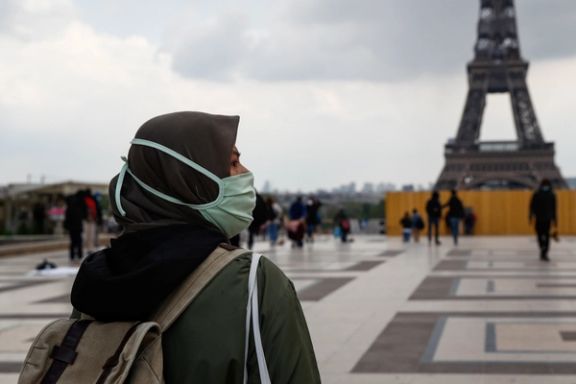
The Islamic Republic is using Iranian students abroad, including those on government scholarships, to pursue its Islamist agenda.
University students living in the diaspora or studying abroad are utilized as an asset to promote Shiite Islamism in Western democracies and recruited to transfer information and know-how to the um-ul-Qora (Islamic motherland).
Iran's Supreme Leader Ali Khamenei appointed Ahmad Vaezi to oversee the Islamic students' organizations in Europe in 2020. As Khamenei’s trustee, he is the direct link between Khamenei’s office and the Islamic Students Associations in Europe. An ardent supporter of the Islamic Republic regime, writing in a letter to members of this union, he said "Try to follow your role model, the great leader of Islam, martyr Qasem Soleimani,” referring to the slain commander killed by the US in 2020. Responsible for the violent proxies across the Middle East, Soleimani has now become a symbolic figurehead for the Iranian regime spreading its influence and destruction not only across the Middle East but to young students in Europe.
Until the 1979 revolution, Islamic student associations in the West mainly consisted of Iranian students and worked against the Pahlavi monarchy while most of them were receiving generous scholarships provided by the government.
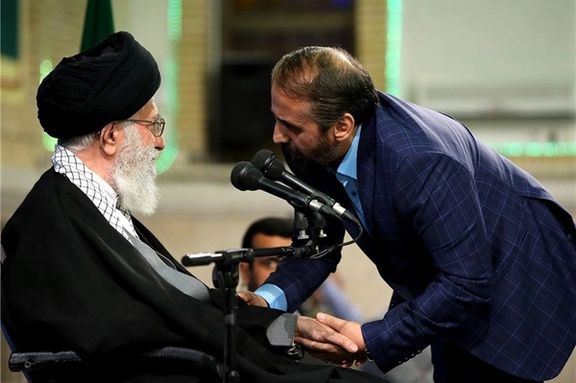
After the revolution, these associations, due to the financial need for government resources and the desire of students to gain power and status through the new regime, were completely at the service of the ideology of the Islamic Republic and purged the opposition forces such as Marxists and MEK members. For about four decades, these associations start their annual gatherings with the messages of Khamenei, Iran’s leader.
While millions of Iranian university students pursue their education by getting loans, working, and using their hard-earned parents’ savings, these students and their family members have a luxury life in universities abroad.
Due to this privilege, they are willing to perform several functions for the regime including spreading political propaganda, participating in anti-Israel Qods (Quds) rallies, and recruiting their professors and colleagues to steal information for bolstering military and technical knowledge in addition to establishing pseudo companies to help Iran’s military programs.
Members of the Islamic Students Association in Britain have met at least eight times with commanders and members of the IRGC since 2020. According to the Jewish Chronicle, the text of the commanders’ speeches has focused on anti-Semitism and anti-West sentiments. They also organized a technological conference held in Tehran in 2023 with invitees including faculty members living in the UK and people who are involved in tech companies in Iran, mostly working for the IRGC.
History has shown that any member of a branch in the coalition of Islamic students associations who criticizes the government faces certain arrest on returning to Iran. An example is Saeed Razavi Faqih, a reformist, who was arrested after entering Iran in 1992 and sentenced to five years in prison and 148 lashes.
Later, they added another 3.5 years to his sentence in prison. Razavi Faqih, who was elected as the general secretary of this coalition, revealed that the associations receive money for their expenses from Khamenei's office through the leader's representatives in Europe. After 1992, reformists were purged from these associations.
Every few years, the members of these associations are invited to Iran, paid for by the government, to meet with Khamenei, groomed for eventually joining the government ranks. The last such meeting was on January 2, 2023, at the height of the student repression during the protests of the Women, Life, Freedom movement. Even amidst mass oppression of students in Iran, the associations still firmly aligned with the regime in Tehran.
Until the beginning of the1990s, members of these associations were mainly related to Shia clerics who were sent to Europe by government propaganda organizations for religious programs such as Muharram mourning and Ramadan ceremonies. In recent years, the connection between the members of these associations has reached the level of continuous communication with the commanders of the Islamic Revolutionary Guard Corps.
The overall path to support a more military-security based regime rather than a religious or hierocratic one is well underway. Khamenei has been successful in transforming the hardcore power of the regime into the hands of a small group of IRGC commanders and sideline the religious establishment and as each year's budget shows, that priority only strengthens year by year.